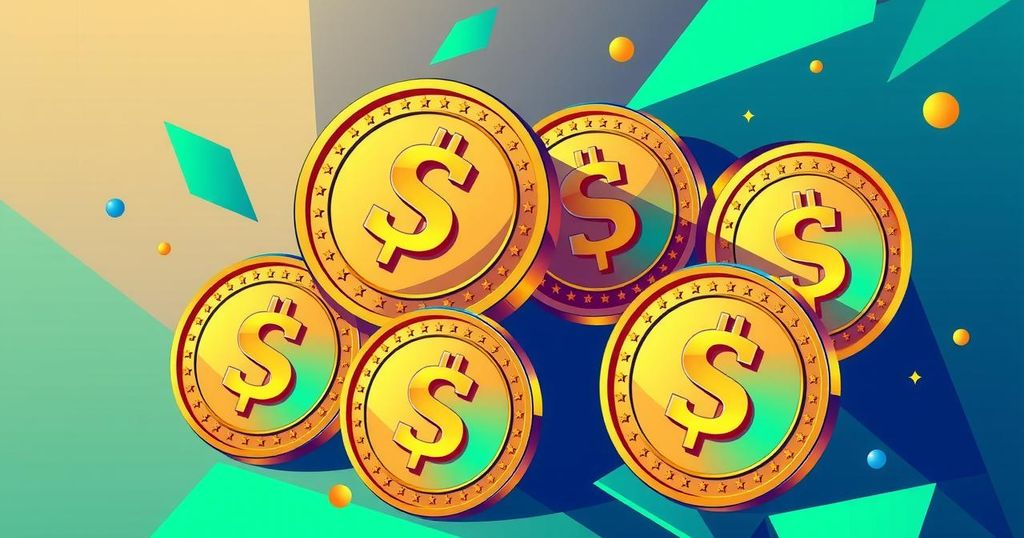Trump’s $TRUMP Coin Dinner Contest Raises $900,000 Amid Ethics Concerns
President Donald Trump, through the promotion of the $TRUMP cryptocurrency, has managed to generate nearly $900,000 in trading fees over two days after announcing a dinner for top investors. This move has raised significant ethical concerns and is perceived as monetising presidential access. Critics like Senators Warren and Schiff have called for investigations into potential corruption related to the token’s promotion. The $TRUMP coin remains under scrutiny as it lacks utility and is controlled overwhelmingly by Trump’s associates.
In a recent whirlwind of cryptocurrency activity, President Donald Trump and his close affiliates have reportedly amassed nearly $900,000 in trading fees within just two days related to the $TRUMP token. This surge followed a Wednesday announcement promising a dinner with Trump to the top 220 token holders, which undoubtedly generated a significant buzz in the crypto community.
The dinner, set for May 22 at Trump’s private Washington club, has been advertised as a black-tie optional event, featuring a reception exclusively for the top 25 holders. Following the dinner, there’s also a VIP White House Tour planned for those lucky top holders, according to details on the Trump coin’s website. This site even showcases an active leaderboard flaunting the usernames of those who hold the most tokens.
In terms of trading activity, the $TRUMP token saw its value skyrocket by more than 50% after the dinner announcement, bringing its total market cap to roughly $2.7 billion. Yet, this has drawn criticism from various political opponents who claim the initiative is a questionable means for Trump to enrich himself further. Senator Chris Murphy, a notable critic, described the whole affair as “the most brazenly corrupt thing a President has ever done.”
The control over the $TRUMP token appears quite concentrated, with around 80% of the supply in the hands of the Trump Organization and its cohorts, as detailed on the project’s website. Since its introduction in January, it has generated an eye-watering $324.5 million in trading fees for insiders, largely due to a mechanism that sets aside a portion of each transaction for wallets belonging to the project’s initiators.
So, what’s a meme coin, you may ask? Well, these digital currencies are created largely based on internet culture and memes; their worth is not reliant on backing assets or utilities. This makes them highly speculative investments, as seen with coins like dogecoin or fartcoin, which have each surpassed market valuations of $1 billion.
To protect investors from sudden massive sell-offs — often referred to as “rug pulls” — most of the $TRUMP token supply is locked under a three-year vesting schedule. This basically prevents insiders from cashing out at once, theoretically providing retail buyers some degree of security.
Nevertheless, the dinner competition has attracted negative attention, being called out as a blatant attempt to monetise a relationship with the presidency. Senators Adam Schiff and Elizabeth Warren have even urged the U.S. Office of Government Ethics to look into whether this situation constitutes “pay to play” corruption. Notably, the White House and the company behind the token have not provided any comments on this unfolding scenario.
Delaney Marsco, director of ethics at the Campaign Legal Center, shared her views with NBC News, pointing out that while this behaviour raises ethical red flags, it might not breach any laws. “Criminal conflicts of interest statutes don’t apply to the president,” she explained, highlighting how this enables actions traditionally considered unethical for previous presidents.
On the flip side, Molly White, an independent crypto researcher, noted that transparency is lacking, as the leaderboard only displays top token holders by their chosen usernames, making it hard to discern who is actually paying for this presidential access. Schiff and Warren raised concerns over reports of $TRUMP investors having connections to foreign exchanges or crypto platforms banned in the U.S., such as Binance.
Interestingly, Trump’s ties to cryptocurrency run deep; following significant contributions from the crypto sector to his campaign, he has repositioned himself as a promoter of digital currencies for the 2024 elections. The $TRUMP token, however, offers no tangible product or service. It’s part of a larger strategy by the Trump family towards entering the crypto market amid growing regulatory uncertainties.
In addition to the $TRUMP and $MELANIA tokens, the Trump family is also backing a decentralized finance initiative, World Liberty Financial, which has seen substantial fundraising success since last October. However, buyers of these tokens can’t resell them and they receive no profits, while a Trump-managed entity retains a hefty 75% of net revenue from these ventures, raising further questions about financial ethics in the administration.




Post Comment